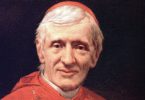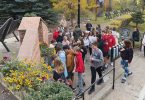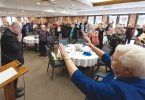
CNS PHOTO/CATHOLIC PRESS PHOTO Pope Paul VI presides over a meeting of the Second Vatican Council in St. Peter’s Basilica at the Vatican in 1963. The pope, dubbed by biographer Peter Hebblethwaite as the first modern pope, led the church from an isolationist mentality to one that’s more familiar today: full of papal visits and discussions on world events.
The church speaks to all humanity
by Joe Bollig
joe@theleaven.org
KANSAS CITY, Kan. — Catholics take it for granted that popes periodically leave the Vatican and visit other countries.
Yet it wasn’t always so.
After the Papal States were captured in 1870, the popes became “prisoners of the Vatican,” unwilling to recognize the authority of the new Kingdom of Italy. The popes stayed close to home even after the Lateran Pact of 1929 resolved this situation.
You have to understand this “prisoner” mentality, and the defensive frame of mind the church held since the Council of Trent ended in 1563, to understand why it was such a big deal for Pope Paul VI to address the United Nations in New York City on Oct. 4, 1965.
Pope Paul VI took a break from the Second Vatican Council to stand before the representatives of all nations and speak about war, peace, poverty, freedom, and the hopes and dreams of humanity for a better world.
“This was the encounter of the modern church with the modern world, ‘Gaudium et Spes’ realized,” wrote Peter Hebblethwaite in his book, “Paul VI: The First Modern Pope.”
“That was the first time I’d ever seen a pope on American soil,” said Father Jerry Spencer, who was ordained on May 29, 1965. “And here he was leaving an international gathering of church leaders to address world leaders in another arena.”
“To me, it signified the universality of the church and its message for the entire world,” he continued. “I thought it was a unique moment in the history of the world and of the church.”
Pope Paul VI’s historic address was shaped by “Gaudium et Spes” (“Joy and Hope”), the Pastoral Constitution on the Church in the Modern World, promulgated on Dec. 7, 1965.
Notably, this is a “pastoral” and not “doctrinal” constitution, wrote Father Donald R. Campion, SJ, in “The Documents of Vatican II.”
“Gaudium et Spes . . . enjoys the interesting distinction of being the only major document to have originated directly from a suggestion made on the floor of the [council] itself,” wrote Father Donald.
“For this reason, but much more of course for the universal interest attaching to the most basic human problems dealt with in the text, this Constitution must rank as possibly the most characteristic achievement of an essentially ‘pastoral’ Council.”
In this document the church broke away from tradition-encrusted modes of thought, broke away from a tendency to look exclusively inward to the church, and spoke instead about its relationship to the world.
“The most distinctive note sounded in the text . . . is that of the church putting itself consciously at the service of the family of man,” wrote Father Donald.
Father Robert Hasenkamp, now retired and living in Topeka, was a newly ordained associate pastor when “Gaudium et Spes” was promulgated.
Like many other young men in the seminary, he followed the council proceedings with enormous interest.
Since he was ordained only six months after the start of the council, he initially celebrated the Mass in Latin and exercised his ministry according to preconciliar ways.
But not for long. The documents of the council offered new ways of understanding and living.
“[The Council Fathers] came to a new understanding of the church as being ‘the people of God,’ of being ‘a pilgrim people,’” said Father Hasenkamp. “Then they had to [ask] how we relate that new understanding of the church to the modern world. How do we present the church to the world in a language they could understand? How should the church interact with the rest of humanity?”
“I think this document moved us from being a church of exclusion to being a church of inclusion,” he continued. “In other words, instead of looking at what keeps us separate or different from others, it stresses our common humanity. It looked beyond itself.”
“Gaudium et Spes” is organized in two parts.
The first (and more doctrinal) part addresses “the church and man’s vocation.” It has four chapters: the dignity of the human person, the community of man, the activity of man in the world, and the church’s function in the world.
The second (and more pastoral) part covers a wide range of topics — from the dignity of marriage and the family and cultural, social and economic life, to peace and the international community.
“[The document] deals with issues I found to be very prophetic,” said Father Spencer. “[The Council Fathers] talk about the dignity of the human person, the activity of man in the world and the church’s function in the world.”
In “Gaudium et Spes,” the church puts itself at the service of humanity, wrote Father Donald.
“The church realized it was called and commissioned to look beyond itself and realize its mission — the mandate Jesus gave us to go and teach all nations,” said Father Spencer. “We were not to isolate ourselves and continue to do a lot of introspection. We are called to take our message out to others.”
“Gaudium et Spes” has stood the test of time, and is a relevant document for Catholics today to help them find their grounding on moral issues, said Father Spencer. It sets a general tone and thrust for the church today.
“There is always a need to have people of vision who are willing to get out of their comfort zone and not be content with the status quo,” he said. “We recognize that our vocation as Christians is a lifelong process of growing into full maturity in Christ.”
“We can never be satisfied with our spiritual progress,” he concluded. “There’s always room to improve and ways to grow.
The church . . . likewise — if it’s going to speak to the people of today — has to be open to that need as well. As it has been said, the church is always in need of reform.”






